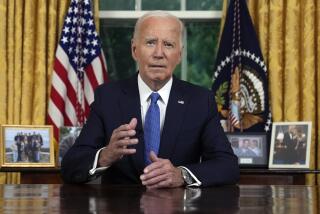Pope Benedict XVI to become first pope in 600 years to resign
- Share via
VATICAN CITY -- Pope Benedict XVI announced Monday that he will step down on Feb. 28 due to failing health, stunning the world’s 1 billion Catholics by becoming the first pope in nearly 600 years to resign from the office.
The German pontiff, 85, made his surprise statement to cardinals during a Vatican concistory on Monday, saying “my strengths, due to an advanced age, are no longer suited to an adequate exercise of the Petrine ministry,” a reference to his duties as leader of the church.
Speaking at a ceremony held to canonize three new saints, Benedict said he would step down at 8 p.m. on Feb. 28. Father Federico Lombardi, a Vatican spokesman, said a conclave of cardinals would be held in March to elect a new pope in time for Easter.
PHOTOS: Pope Benedict XVI to step down
Italian cardinal Angelo Sodano, the dean of the College of Cardinals, said Benedict’s announcement was a “bolt out of the blue.”
Describing his decision as being “of great importance for the life of the church,” Benedict told cardinals that “in today’s world, subject to so many rapid changes and shaken by questions of deep relevance for the life of faith, in order to govern the bark of Saint Peter and proclaim the Gospel, both strength of mind and body are necessary.”
His strength, he added, “has deteriorated in me to the extent that I have had to recognize my incapacity to adequately fulfill the ministry entrusted to me.”
Vatican insiders have noted that Benedict has become more frail in recent months; he requires a moving platform to transport him down the aisle at St Peter’s Basilica during services and has slowed during his walks in the Vatican gardens. His private life was recently exposed to public scrutiny after his butler was convicted by a Vatican court for leaking papal correspondence.
Lombardi said Benedict had not been persuaded to step down by a particular illness, but said “he had become more tired and fatigued than in the past.”
Benedict’s decision, which he described as being “of great importance for the life of the church,” marks the first papal resignation since Pope Gregory XII reluctantly stepped down in 1415 to end a dispute with a rival claimant to the papacy. The last pope to resign willingly was Celestine V in 1294 after reigning for only five months.
FULL TEXT: Pope Benedict XVI’s announcement
Benedict told cardinals he wished to “devotedly serve the Holy Church of God in the future through a life dedicated to prayer.” Lombardi said the pope would transfer from his papal apartment to live in a building in the Vatican’s gardens formerly occupied by nuns. The pope, who has recently finished a series of three books about the life of Jesus, could continue to write books, Lombardi said.
Beyond giving details of the coming conclave, Lombardi said the Vatican was entering unchartered waters with a pope set to replace a living, former pope. “We are heading into an unknown situation,” he said at a hastily called Vatican news conference.
Describing the moment the pope made his announcement, Lombardi said “the pope sat down, took the microphone and read his statement shortly after 11:30,” adding “he said it in Latin so not everyone understood immediately.”
Lombardi said he had no fear that Vatican officials -- unaccustomed to sharing the Holy See with a former pope -- might continue to defer to Benedict. “This is recognized by canon law, there is no risk of confusion,” he said.
Lombardi said the German pontiff, who was elected in 2005 at age 78, had shown “courage, a humble spirit, responsibility and a desire that the church be governed in the best way,” adding that he had met the pope recently and found him “serene.” The pontiff’s decision, he said, “did not completely surprise me.”
Benedict has previously suggested that a pope could break with tradition and step down if he no longer felt able to carry out his duties.
In a book-length interview, “Light of the World,” with the German journalist Peter Seewald, Benedict responded to a question about whether a pope could resign: “Yes. If a Pope clearly realizes that he is no longer physically, psychologically, and spiritually capable of handling the duties of his office, then he has a right and, under some circumstances, also an obligation to resign.”
The pope’s decision will trigger weeks of speculation about who will take his place as the Vatican recovers from the scandal of pedophile priests and seeks to retain believers as the church challenges rights to abortion and gay marriage.
Asked if Benedict had set an example for future popes to resign instead of dying in office, often after debilitating illness, Lombardi said: “This is not intended to influence successors,” but he added, “Next time [it happens], it won’t be the first time in centuries, it could be an approach to the problem.”
One Vatican expert said Benedict had probably been mulling his decision to resign since his election eight years ago. “When he took over the church had been through the suffering from illness of his predecessor John Paul II,” said John Thavis.
“It will have put in his mind questions about the governance of the church if the pope becomes incapable,” he said.
ALSO:
Girl shot by Taliban is discharged from hospital in Britain
Gunmen kill polio immunization workers in northern Nigeria
Israel foils fifth Palestinian bid to build West Bank tent village
Kington is a special correspondent.
More to Read
Sign up for Essential California
The most important California stories and recommendations in your inbox every morning.
You may occasionally receive promotional content from the Los Angeles Times.










